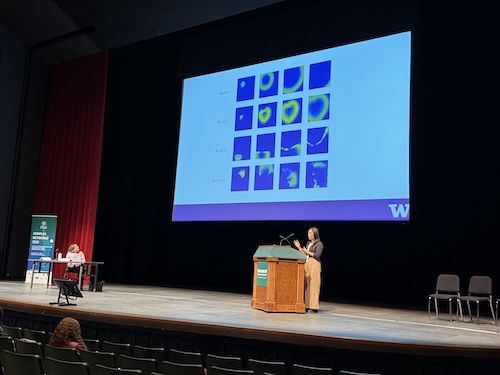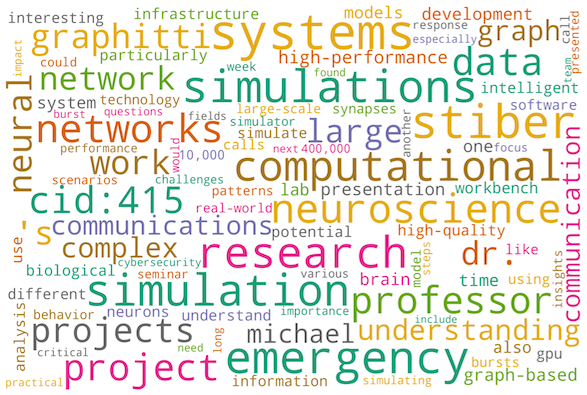Conference Paper.
Vanessa Arndorfer presented the paper, "Effects of Spike Timing Dependent Plasticity on Structure and Behavior of Simulated Neural Networks" at the Complex Networks 2025 conference in Binghamton, New York.

AI and graph-based systems.
Vanessa Arndorfer presented the paper, "Effects of Spike Timing Dependent Plasticity on Structure and Behavior of Simulated Neural Networks" at the Complex Networks 2025 conference in Binghamton, New York.

Marina Rosenwald successfully defended her MS project, "Application of Graph Neural Networks in Spike-Time-Dependent-Plasticity Graphitti Simulations".
Nicolas Posey successfully defended his MS project, "Implementing a GPU Model for Simulating Emergency Services Communication Systems".
Siqiao Ye successfully defended her MS project, "Incident Classification of Emergency Services Communication System (ESCS)".
We've produced the summer releases of our graph systems simulator, Graphitti (v1.1), and our graph systems analysis software (v0.5-alpha). This version of Graphitti includes a number of enhancements and significant negative code written (with the promise of more negative code as we push some of the changes through the code base), including the ability to write graph structures out during the simulation (and at the end), a redo of how we specify graphs (so we're now exclusively using GraphML for this), working CPU STDP (spike timing dependent plasticity) code, new Recorder classes for simplified data file generation requiring no new code for new models, a new DeviceVector class for automatic GPU memory management, and a variety of internal improvements (mostly simplifications). Our graph systems analysis code includes code for analyzing STDP effects on structure and behavior, spatiotemporal behavior analysis of neural networks, and basic analyses for ESCS (emergency services communications systems).
Hari Priya Dhanasekaran successfully defended her MS thesis, "Understanding Neural Burst Patterns Through Graph Neural Network Explainability in Simulated Neuronal Networks".
Arjun Taneja successfully defended his MS project, "Spatiotemporal Analysis of Neuronal Avalanches in Self-Organized Criticality".
Vanessa Arndorfer successfully defended her MS thesis, "Network Behavior Analysis of Spike Timing Dependent Plasticity (STDP) in Simulated Neural Networks".
Prof. Stiber gave the presentation, "Spatiotemporal bursting in simulated cortical cultures", co-authored with Natalie Gonzales, at the Neural Coding 2025 meeting in Monte Verità Ascona (Ticino), Switzerland.
Avikant Wadhwa successfully defended his MS thesis, "Abstractions for Code Migration from CPU to GPU in Simulation Domain".
Our lab contributed a chapter to the book Perspectives on Paradata: Research and Practice of Documenting Data Processes, which had its official book launch today. The book is open access and can be downloaded free of charge. Our chapter is "Paradata in Emergency Services Communications Systems", by Megan Cohen, Jardi Martinez Jordan, M. Scott Sotebeer, and Michael Stiber.
Prof. Stiber gave the keynote talk, "An Orientation to AI for Natural Intelligences" at the IEEE New Era AI Innovation Renaissance conference in Bothell.
Jardi Martinez Jordan presented the paper "Graph-based Modeling and Simulation of Emergency Services Communication Systems", co-authored with Prof. Stiber, at the 32nd International Conference on Modeling, Analysis and Simulation of Computer and Telecommunication Systems (MASCOTS) in Krakow, Poland.
Xiang Li successfully defended her MS project, "Agile Data Recording Architecture for Complex Scientific Simulations".
Jardi Martinez Jordan successfully defended his MS thesis, "Graph-based Modeling and Simulation of Emergency Services Communication Systems".
Prof. Stiber
regularly presents an introduction to our lab's
work at the CSS graduate seminar, CSS 599; this is
one way that our graduate students learn about
INL. At this meeting, he received a word cloud
from students' summaries of his talk:

We had one undergraduate present at the UWB School of STEM Summer Symposium: Andrzej Dawiec, "Developing Graph-Based Systems With Graphitti".
Link to Publication
Alumna Jewel Lee's publication, "Ambulatory Risk Models for the Long-Term Prevention of Sepsis:
Retrospective Study"
is linked above.
Divya Kamath successfully defended her MS project, "Migrating a complex, CPU-GPU based simulator to modern C++ standards".